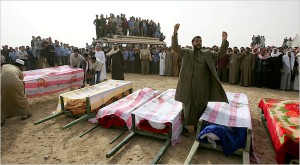Analysis of U.S. Attack on Syrian Border
BY Herschel SmithVillagers in Syria gathered Monday near the coffins of people who died during an American Special Operations raid aimed at Iraqi militants on Sunday (Hussein Malla/Associated Press).
In U.S. Combat Action Across the Syrian Border we puzzled over why the attack on the suicide bomber network at the Syrian border had come now and not later (or not at all). The Captain’s Journal had recommended more than one year ago that these actions be taken. In a recent report it has been claimed that Syrian intelligence knew and approved of the raid.
Publicly America is still saying nothing but US officials are making intriguing claims off the record.
Now, a respected Israeli intelligence expert says he has been told the operation was carried out with the knowledge and co-operation of Syrian intelligence.
Ronen Bergman, author of The Secret War with Iran, makes the claim in the Yediot Ahronoth newspaper, based on briefings with two senior American officials, one of whom he says until recently “held a very high ranking in the Pentagon”.
Mr Bergman told Sky News the raid happened after America had lobbied Syria intensely to deal with an al Qaeda group conducting activity on the border.
The Syrians were unwilling to be seen publicly bowing to US pressure to tackle the group, he says, but in the end gave the Americans the green light to do so themselves.
He claims the Syrian government told the Americans: “If you want to do this, do it. We are going to give you a corridor and carte blanche. We will not harm your troops.”
Syria is still an apparatchik of the radical Iranian Mullahs, and we doubt this report (it sounds like something that DEBKAfile would publish, along with seeing pigs fly and green Martians landing). Damascus gets its orders from Tehran. It’s more likely that Syrian complaints before the U.N. are representative of its government’s position (and certainly of the Iranian position).
DAMASCUS (AFP) — Syria on Tuesday protested to the UN Security Council over what it branded a barbarous US helicopter raid on a village near the Iraqi border and decided to close two American institutions in Damascus.
The government also indicated Sunday’s deadly raid, launched from Iraq, could have repercussions on ties with Baghdad by postponing a November 12-13 meeting of the Syrian-Iraqi high commission.
Baghdad initially appeared to condone the raid by US troops as aimed against insurgents who infiltrate Iraq, before joining in condemnation of the assault on Tuesday.
In a letter to UN chief Ban Ki-moon, Syria protested “this aggressive act and expects the UN Security Council and member countries to assume their responsibility by preventing a repetition of this dangerous violation.”
It called for the Security Council “to hold the aggressor responsible for the deaths of the innocent Syrian nationals,” state news agency SANA reported, quoting the letter.
In New York, Syria’s ambassador to the United Nations, Bashar Jaafari, said the letters asked Ban and the Security Council “to assume their responsibility” to prevent any repeat of “such aggressive and terrorist acts against a sovereign member of the United Nations.”
The next few paragraphs of this report are not only interesting, but very important moving forward with U.S. force presence in Iraq.
In Baghdad, the government slammed the assault, which an unnamed official in Washington said was believed to have killed Abu Ghadiya, “one of the most prominent foreign fighter facilitators in the region.”
“The Iraqi government rejects the US helicopter strike on Syrian territory, considering that Iraq’s constitution does not allow its land to be a base for launching attacks on neighbouring countries,” spokesman Ali al-Dabbagh said.
“We call upon American forces not to repeat such activities and Baghdad has launched an investigation into the strike.”
On Monday, Dabbagh said the raid targeted a border area used by insurgents to launch attacks on Iraq.
Iraq’s parliament said it regretted that “the operation took place at a time when relations between Iraq and its neighbours are progressing.”
According to the draft Status of Forces Agreement for U.S. forces in Iraq, Article 4 [3], this strike would not be allowed or legal. This hasn’t stopped U.S. officials from anonymously claiming that they may happen again.
There has been continued official silence from the Pentagon and the State Department regarding the raid on Sunday … Despite Syrian outrage and the threat of retaliation by Syrian troops, officials did not rule out mounting such a raid again.
The official silence of DoD and the State Department precisely comports with counsel given here at The Captain’s Journal. As for the “anonymous officials” who go on record with the main stream media, they are cowards for not giving their names and should be fired for divulging any information at all. They are undermining the war effort. But that’s a different problem, one the DoD should be working to solve.
We don’t wish for a cease and desist order on U.S. operations across the Syrian border. In fact, this analysis calls into question the viability of the Iraq SOFA if it doesn’t allow raids such as this one (we have recommended seeing the long war as one without territorial borders). But the administration may have waited about four years too late to conduct cross border raids against Syria (for Sunni insurgents and terrorists) and Iran (for IRG, Quds and “special groups”). While a hard fought and bloody victory in Iraq has been essentially won by U.S. forces, our hands are tied under the new SOFA. Unfortunately, it’s a lame duck administration that is ordering the raids, and General Odierno, for all of the admiration that The Captain’s Journal has for him, might have been dealt a bad hand in the SOFA.




